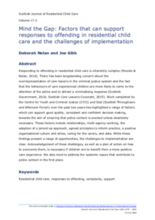Abstract
Responding to offending in residential child care is inherently complex (Moodie & Nolan, 2016). There has been longstanding concern about the overrepresentation of care leavers in the criminal justice system and the fact that the behaviours of care experienced children are more likely to come to the attention of the police and to attract a criminalising response (Scottish Government, 2018; Scottish Care Leavers Covenant, 2015). Work completed by the Centre for Youth and Criminal Justice (CYCJ) and Staf (Scottish Throughcare and Aftercare Forum) over the past two years has highlighted a range of factors which can support good quality, consistent and confident decision making, towards the aim of ensuring that police contact is avoided unless absolutely necessary. These factors include relationships, multi-agency working, the adoption of a joined-up approach, agreed principles to inform practice, a positive organisational culture and ethos, caring for the carers, and data. While these findings present a range of opportunities, the challenges to implementation are clear. Acknowledgement of these challenges, as well as a plan of action on how to overcome them, is necessary if children are to benefit from a more positive care experience. We also need to address the systemic issues that contribute to police contact in the first place.

